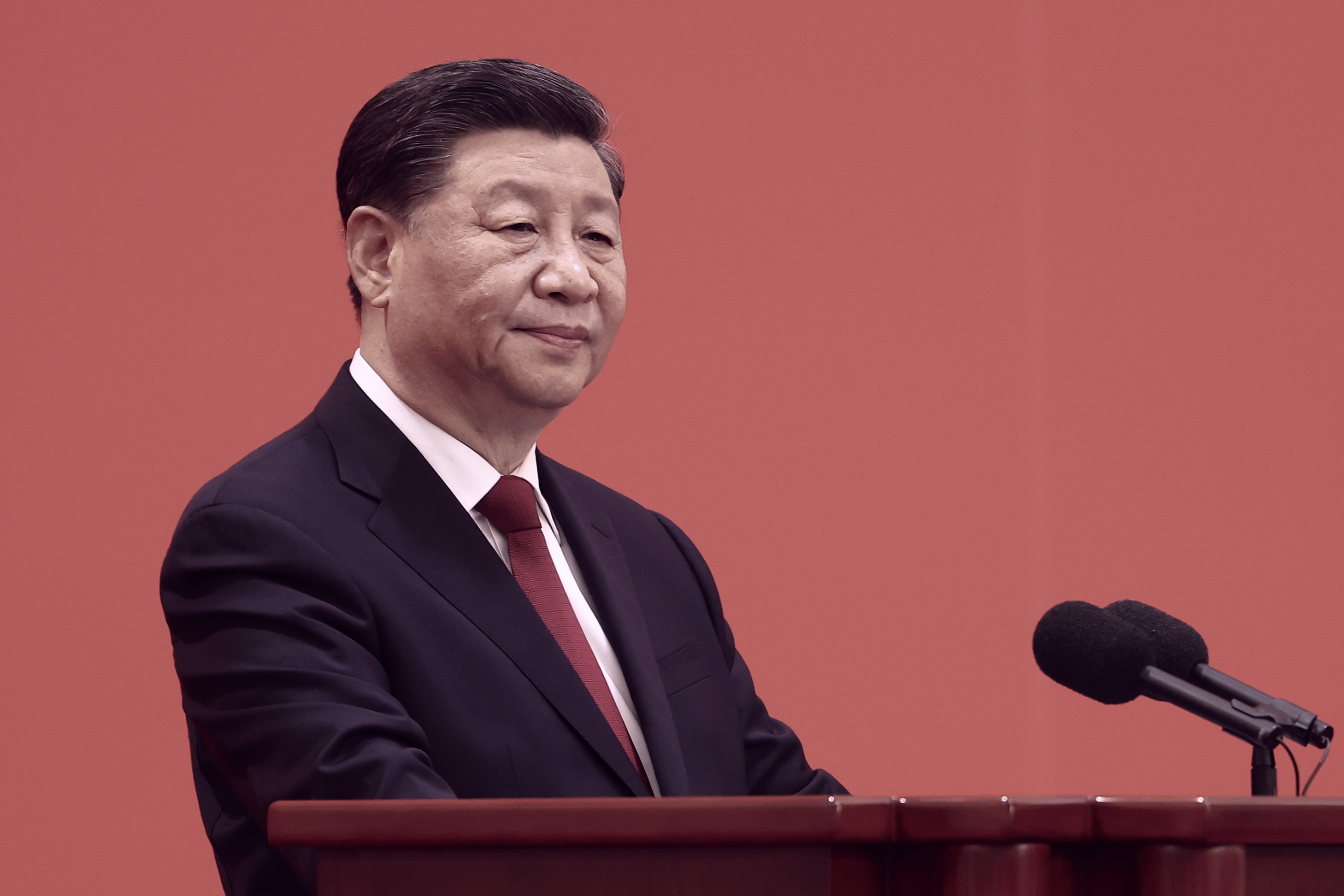Is China Totalitarianism - This week marks the 50th anniversary of the start of the Cultural Revolution in China. Beginning in 1966, Mao Zedong, who had retreated somewhat from China's leadership in previous years, engaged China's youth in a new campaign against party defectors and class enemies. Ultimately, It has destroyed the careers and livelihoods of millions of Chinese, including country musicians, and anyone who exhibits any Western-influenced work or occupation. Violence grew rapidly, especially in the countryside, and did not subside until after Mao's death in 1976.
In retrospect, these events have a lot of world historical significance. With the Khmer Rouge's terrorist act in Cambodia, The Cultural Revolution was the last outgrowth of the totalitarian regimes of the 20th century, including Stalin's Russia and Hitler's Germany. One of the old theories was taken over by all. 20th century literature; George Orwell's
Is China Totalitarianism

All authoritarian regimes share some characteristics. They control all aspects of their people's lives. specific enemies; They tried to involve everyone in a common struggle against foreign and domestic opposition, and to force them all to conform to the official ideology. In Stalin's Russia and Mao's China, the main enemy was the class enemy: the capitalists; Landlords Rich peasants and various foreign spies. Socialists and Communists in Nazi Germany; It includes all those who do not belong to the national community, including Jews and other ethnic minorities. All of these governments are formed by a single party that stands outside, but is also a traditionally dominant government. All of them killed or imprisoned millions of their own citizens. All of them organize young men and women into various organizations and uniformed militias to channel their energies into an approved political direction. In China and the Soviet Union, national economies were also captured. Dissent was not allowed to arise and all forms of public expression were completely monopolized. What distinguishes them above all other authoritarian regimes is that they sincerely mobilize all their people in the struggle against designated enemies.
Chinese Influence In Australia Hi Res Stock Photography And Images
As with all successful historical events, These rulings are based on real aspects of human nature. Participating in ordinary combat was incredibly liberating and exciting, and all nations used it during the war. However, the problem facing all these governments is that these ambitions can only last for so long.
Eventually, scholars and others tire of the struggle and want to settle down to enjoy a more peaceful life. But such changes would weaken compliance with the regime and its goals. The leadership generally responds with a new campaign against its enemies—but by this time most of its real enemies are dead or long in exile. Therefore, we must oppose the party structure, whether it is against the innocent people. This is what Stalin did in the 1930s when Mao decided 50 years ago to abolish the leadership of the party and the military. Orwell was at the height of Stalinism and Mao was winning his civil war. He captured the atmosphere of an endless struggle against imaginary enemies.
Away from the suspicions of neighbors or his children, members of the party disappear from time to time.
However, we should not lose sight of other important aspects of these governments. Although they succeed in expressing the will of the masses and inciting terror, they present themselves as the pinnacle of human intelligence based on science and reason. Stalin and Mao Zedong were implementing Karl Marx's "scientific socialism," and Hitler thought racial cleansing would create a better humanity for himself and the Nazis. I'm sure, All of these regimes had incredible achievements in infrastructure and industry (at least in the USSR and Germany) and in warfare. However, no one was able to establish their rule. The war brought down the Nazis after only 12 years, and the forces of nature brought down the USSR and Communism in 1989, 72 years later.
Totalitarianism: A Letter To Fellow China Analysts
The Communist Party still rules China, but 67 years after Mao Zedong came to power, they don't even think about declaring the country a totalitarian state. The same can be said about Vietnam. Although a benign totalitarian regime lasted 57 years in Cuba, Opening relations with the US will soon bring more changes there. North Korea is now the only surviving example of a 20th-century totalitarian system.
After the collapse of the Soviet Union, the 1990s were predicted by many as the eternal triumph of democracy. But as the Cultural Revolution approached in China, a different kind of authoritarianism began to take its place, based not on education but on religion. The Khomeini regime in Iran, which came to power in 1979, wanted to control all aspects of Iranian life according to a strict interpretation of Islam. In the past, many traditional countries enacted religious rules. This was the first national government in the 20th century to use a modern government to enforce religious observance and ethics. A year after taking power, the government needed to mobilize its people after the eight-year war with Iraq. Iran's regime, now 37 years old, has seen its ideological fervor cool, like the USSR in 1954 or Communist China in 1986.
The Iranian regime had its imitators. ISIS is now creating a new authoritarian movement based on its interpretation of Islam. Although the group is not internationally recognized as a state, it has the hallmarks of a totalitarian state: ruling over the lives of all people under its control; violent killings of non-Muslims; He pledged himself to an endless struggle to conquer the entire Middle East. . To create a Caliphate.

The drive to rule the lives of all human beings is always the basis of tyranny. These new movements were nowhere near as large or dangerous as communism or Nazism. They pose a great philosophical challenge to the modern world. While the Nazis and Communists argued that all their actions were based on reason and science, ISIS rejected both and specifically appealed to faith. They have resumed the battle between faith and reason that seemed to have won a few decades ago.
Moving Backward': In Xi's China, Some See An Era Of Total Control
Historian David Kaiser, Harvard; Carnegie Mellon; He taught at Williams College and the Naval War College. He is the author of seven books, including one about Communist China's supreme leader, Teng Xiaoping, who took over the leadership of a country nearly destroyed by Mao Zedong's radical Marxist experiments four decades ago. Proceed with the Great Leap Forward Cultural Revolution and announce a new economic policy of "Socialism with Chinese Characteristics".
Many Western scholars predict that political liberalization will soon follow the economic "liberation" initiated by Deng. Others doubt that the Communist Party will give up any meaningful measure of its political power. Finally, Deng remarked firmly, "We will stick to Marxism and follow the path of socialism."
Has Communist China become more independent over the years? Has the international community shown a willingness to respect political and human rights? It's an important question for the United States, whose president has declared that US-China relations may be the best they've ever been. What? Do you focus on the freedom and democracy of Communist China or on Marxism-Leninism and totalitarianism?
There is alarming evidence of the latter course. Consider China's aggressive approach to Hong Kong and its actions in the South China Sea, its attempts to coerce the island's democracy into accepting Chinese rule; Consider the dire situation with huge loans for cash-starved Asian countries. Africa The blatant theft of intellectual property by US companies doing business in South America and China; Is the People's Republic of China returning to totalitarianism?
What The West Gets Wrong About Xi's 'totalitarian Shadow'
A comprehensive measure of a country's position in the political arena is Zbigniew Brzezinski's six characteristics of an authoritarian state: legitimacy; A political party, usually led by one person; secret police party's communication control; party, many people military control A centralized economy. Where is Communist China headed?
China is governed by an official socialist teaching body that covers all sectors of society. At the 2017 Party Congress, the Communist Party adopted a new phrase for its constitution - "Xi Jinping's Thoughts for a New Character with Chinese Characters" - elevating President Xi to the deity status of Mao Zedong and Deng Xiaoping. There are portraits of Xi and Mao in the Congress Hall.
Since President Xi came to power

What is totalitarianism definition, what is the meaning of totalitarianism, what is the definition of totalitarianism, what is totalitarianism, how polluted is china, totalitarianism in china, what is a totalitarianism government, what is an example of totalitarianism, what is totalitarianism government, china totalitarianism, is myott china valuable, is coalport china valuable


0 Comments